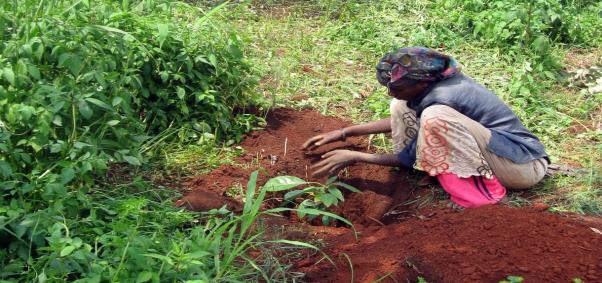
A Way Forward for Food, Land Use in Ethiopia
By Minister Gemedo Dalle (PhD) and Paul Polman
This article was first published in the Addis Fortune.
H.E. Dr. Gemedo Dalle is the Ethiopian Minister of Environment, Forest and Climate Change. Paul Polman is the CEO of Unilever and co-chair of the Global Commission on the Economy and Climate.
Blessed with rich natural resources, from dense forests to highland massifs and mountain ranges, agriculture is the backbone of Ethiopia’s way of life and rapid economic development. Four in every five Ethiopians are employed in agriculture. The sector contributes approximately 36pc to the national gross domestic product (GDP).
Yet recent trends are putting increasing pressure on Ethiopia’s precious food and land use systems. High rates of deforestation and land degradation threaten the natural resources on which many Ethiopians depend on. Despite impressive economic growth – with a growth rate of nearly 10pc GDP since 2010 – malnutrition continues to blight the country. Prevalence of stunting in children under five stood at 38pc in 2016.
At the same time, rates of obesity and diet-related non-communicable diseases like “Type 2” diabetes are growing in cities, including Addis Abeba. Urbanisation brings with it additional pressures, including higher consumption levels, increased pressures on the land, more complex supply chains and infrastructure challenges.
Agriculture is a major consumer of scarce water supplies, and demand is rising rapidly. Coupled with disruption to the water cycle as a result of climate change, these stressors could further exacerbate the risk of food insecurity for the country’s growing population.
We need transformative change. There is a huge opportunity in Ethiopia shifting to more sustainable patterns of land use, food production, and consumption. Across Africa, the economic opportunity in shifting to sustainable agricultural and land use practices could exceed 367 billion dollars and create over 21 million new jobs by 2030, according to the Business & Sustainable Development Commission.
Sustainable systems could provide a healthier, less wasteful way to feed Ethiopia’s growing population while protecting and, over time, regenerating its precious natural resources.
Ethiopia is not alone. Around the world, food and land use systems are ripe for change. They could become drivers of economic growth, improve the health and prosperity of the population, and mitigate climate risks to achieve greater resilience. Respecting and restoring our land globally could shift it from contributing as much as 30% of the world’s greenhouse gas emissions to instead act as a net carbon sink.
Ethiopia is already an international leader in promoting a ‘climate-resilient green economy’ – a vision that Prime Minister Abiy Ahmed (PhD) carries forward from two predecessors. The country is also well-positioned to lead by example, due to its variety of crops, forests and restored landscapes and its rich culinary traditions.
Specific opportunities include ecosystem restoration: a focus on forest development and sustainable biodiversity management could lift Ethiopia out of poverty and contribute to ensuring food security. Additionally, the country’s natural riches could offer opportunities to diversify commercial products for international markets – Ethiopia’s neighbours and the Middle East offer particularly significant opportunities.
As producers, manufacturers, and retailers of much of the world’s food, business has a responsibility to help lead this urgent transformation. Many companies in Ethiopia and around the world are already acting, both because it is the right thing to do and because it represents a tremendous opportunity. Pioneering innovations, including micro-irrigation, extending market access, GPS and sensor technology, can preserve resources while future-proofing supply chains and tap into new market opportunities.
Yet no company can transform food and land use systems alone. To unlock these opportunities, business leaders, policy-makers and others working in related sectors need long-term, science-based targets and pathways to make better-informed decisions. They need strategies to implement shorter-term strategic decisions. They need support to identify investment priorities and develop funding mechanisms that align with the longer-term vision. A true partnership of public and private stakeholders across the whole value chain is the only way we can address this systemic challenge.
Efforts like the Food & Land Use Coalition, which formally launches its national program at the Climate Resilient Green Economy Review meeting in Addis Abeba, can help. The Coalition connects academics, businesses, investors, policy-makers, international organisations, members of civil society, grassroots organisations and farmers’ representatives. Together, Coalition members work to develop strategic, science-based transformation programs for food and land use systems, and to put these into action.
Ethiopia is one of the first countries in which the Coalition is launching a national program of work. This reflects the country’s remarkable vision and leadership on the food and land use agenda. The Ethiopian Development Research Institute (EDRI) will lead the work on science-based targets and pathways, along with international partners.
The Coalition is working with the Agricultural Transformation Agency (ATA) on agricultural commercialisation clusters. The Coalition is also working closely with the Ministry of Environment, Forest & Climate Change (MoEFCC), the Ministry of Agriculture & Livestock (MoAL) and the National Planning Commission, as well as several well-known non-governmental organisations working in this field.
Ethiopia’s land restoration targets are hugely ambitious: by working across sectors and with a wide range of people, the aim is to deliver on these and other targets while creating opportunities for local communities and businesses.
More integrated, far-sighted and holistic food and land use systems can deliver a brighter future for people and the planet. By collaborating to grow collective knowledge, develop long-term strategies and invest in innovations, Ethiopia can continue to serve as a world leader and tap into a momentous opportunity.

